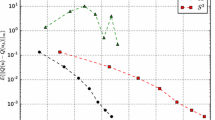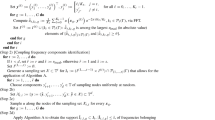Abstract
In this work we propose and analyze a weighted proper orthogonal decomposition method to solve elliptic partial differential equations depending on random input data, for stochastic problems that can be transformed into parametric systems. The algorithm is introduced alongside the weighted greedy method. Our proposed method aims to minimize the error in a \(L^2\) norm and, in contrast to the weighted greedy approach, it does not require the availability of an error bound. Moreover, we consider sparse discretization of the input space in the construction of the reduced model; for high-dimensional problems, provided the sampling is done accordingly to the parameters distribution, this enables a sensible reduction of computational costs, while keeping a very good accuracy with respect to high fidelity solutions. We provide many numerical tests to assess the performance of the proposed method compared to an equivalent reduced order model without weighting, as well as to the weighted greedy approach, in both low and high dimensional problems.











Similar content being viewed by others
Notes
We assume that \(\mathcal {U}\) is a quadrature rule for integration with respect to dy. If a quadrature rule \(\mathcal {U}_{\rho }\) for integration with respect to the weighted measure \(\rho dy\) is used instead, that is suffices to take \(w_i = \omega _i\).
When using tensor product quadrature rule, we can not impose the cardinality of \(\varXi _t\) a priori. We also note that when we use the Clenshaw–Curtis approximation, the majority of the points in \(\varXi _t\) lies on \(\partial \varGamma \): these point are completely negligible, since \(\rho |_{\partial \varGamma } \equiv 0\). So, in this case, we need to take a considerably larger value for \(n_t\) to reach the desired cardinality of nodes in the interior \(\mathring{\varGamma }\).
The standard algorithms are obtained imposing unitary weights and sampling from uniform distribution.
References
Bäck, J., Nobile, F., Tamellini, L., Tempone, R.: Stochastic spectral galerkin and collocation methods for pdes with random coefficients: a numerical comparison. In: Hesthaven, J.S., Rønquist, E.M. (eds.) Spectral and High Order Methods for Partial Differential Equations: Selected Papers from the ICOSAHOM ’09 conference, June 22–26, Trondheim, Norway, pp. 43–62. Springer, Berlin (2011)
Ballarin, F., Sartori, A., Rozza, G.: RBniCS—reduced order modelling in FEniCS. http://mathlab.sissa.it/rbnics (2015)
Barrault, M., Maday, Y., Nguyen, N., Patera, A.: An ‘empirical interpolation’ method: application to efficient reduced-basis discretization of partial differential equations. Comptes Rendus Mathematique 339(9), 667–672 (2004)
Bathelmann, V., Novak, E., Ritter, K.: High dimensional polynomial interpolation on sparse grids. Adv. Comput. Math. 4(12), 273–288 (2000)
Benner, P., Cohen, A., Ohlberger, M., Willcox, K.: Model Reduction and Approximation: Theory and Algorithms, vol. 15. SIAM (2017)
Benner, P., Gugercin, S., Willcox, K.: A survey of projection-based model reduction methods for parametric dynamical systems. SIAM Rev. 57(4), 483–531 (2015)
Benner, P., Ohlberger, M., Patera, A., Rozza, G., Urban, K.: Model Reduction of Parametrized Systems. Springer, Berlin (2017)
Bistrian, D., Susan-Resiga, R.: Weighted proper orthogonal decomposition of the swirling flow exiting the hydraulic turbine runner. Appl. Math. Model. 40(5–6), 4057–4078 (2016)
Brezis, H.: Functional Analysis, Sobolev Spaces and Partial Differential Equations. Springer, Berlin (2010)
Chaturantabut, S., Sorensen, D.C.: Nonlinear model reduction via discrete empirical interpolation. SIAM J. Sci. Comput. 32(5), 2737–2764 (2010)
Chen, P.: Model order reduction techniques for uncertainty quantification problems. Ph.D. thesis, École polytechnique fédérale de Lausanne EPFL (2014)
Chen, P., Quarteroni, A., Rozza, G.: A weighted reduced basis method for elliptic partial differential equations with random input data. SIAM J. Numer. Anal. 51(6), 3163–3185 (2013)
Chen, P., Quarteroni, A., Rozza, G.: Comparison between reduced basis and stochastic collocation methods for elliptic problems. J. Sci. Comput. 1(59), 187–216 (2014)
Chen, P., Quarteroni, A., Rozza, G.: A weighted empirical interpolation method: a priori convergence analysis and applications. SESAIM. Math. Model. Numer. Anal. 4(48), 943–953 (2014)
Chen, P., Quarteroni, A., Rozza, G.: Multilevel and weighted reduced basis method for stochastic optimal control problems constrained by stokes equations. Numerische Mathematik 1(133), 67–102 (2016)
Chen, P., Quarteroni, A., Rozza, G.: Reduced basis methods for uncertainty quantification. SIAM/ASA J. Uncertain. Quantif. 5(1), 813–869 (2017)
Cliffe, K.A., Giles, M.B., Scheichl, R., Teckentrup, A.L.: Multilevel monte carlo methods and applications to elliptic pdes with random coefficients. Comput. Visual. Sci. 14(1), 3 (2011)
Dahmen, W.: How to best sample a solution manifold? In: G.E. Pfander (ed.) Sampling Theory, a Renaissance: Compressive Sensing and Other Developments, pp. 403–435. Springer, Berlin (2015)
Fan, Z., Liu, E., Xu, B.: Weighted principal component analysis. In: International Conference on Artificial Intelligence and Computational Intelligence, pp. 569–574. Springer, Berlin (2011)
Gabriel, K.R., Zamir, S.: Lower rank approximation of matrices by least squares with any choice of weights. Technometrics 21(4), 489–498 (1979)
Gerstner, T., Griebel, M.: Numerical integration using sparse grids. Numer. Algorithms 3–4(18), 209–232 (1998)
Haber, M., Gabriel, K.: Weighted Least Squares Approximation of Matrices and Its Application to Canonical Correlations and Biplot Display. Tech. rep. Department of Statistics, University of Rochester, Rochester (1976)
Hesthaven, J., Rozza, G., Stamm, B.: Certified Reduced Basis Methods for Parametrized Partial Differential Equations. Springer, Berlin (2016)
Holtz, M.: Sparse Grid Quadrature in High Dimensions with Applications in Finance and Insurance. Springer, Belrin (2010)
Lang, J., Scheichl, R.: Adaptive multilevel stochastic collocation method for randomized elliptic PDEs. Preprint 2718 (2017)
Loève, M.: Probability Theory. Springer, Berlin (1978)
Logg, A., Mardal, K.A., Wells, G.: Automated Solution of Differential Equations by the Finite Element Method: The FEniCS Book, vol. 84. Springer, Berlin (2012)
Nobile, F., Tempone, R., Webster, C.G.: A sparse grid stochastic collocation method for partial differential equations with random input data. SIAM J. Numer. Anal. 5(46), 2309–2345 (2008)
Novak, E., Ritter, K.: High dimensional integration of smooth functions over cubes. Numerische Mathematik 1(75), 79–97 (1996)
Oksendal, B.: Stochastic Differential Equations. An Introduction with Applications. Springer, Berlin (1998)
Owen, A.B.: Monte Carlo theory, methods and examples (2013). http://statweb.stanford.edu/~owen/mc/
Peherstorfer, B., Cui, T., Marzouk, Y., Willcox, K.: Multifidelity importance sampling. Comput. Methods Appl. Mech. Eng. 300, 490–509 (2016)
Quarteroni, A., Rozza, G., Manzoni, A.: Certified reduced basis approximation for parametrized partial differential equations and applications. J. Math Ind. 1(1), 3 (2011)
Spannring, C.: Weighted reduced basis methods for parabolic PDEs with random input data. Ph.D. thesis, Graduate School CE, Technische Universität Darmstadt (2018)
Spannring, C., Ullmann, S., Lang, J.: A weighted reduced basis method for parabolic PDEs with random data. arXiv preprint arXiv:1712.07393 (2017)
Sullivan, T.: Introduction to Uncertainty Quantification. Springer, Berlin (2015)
Tamuz, O., Mazeh, T., Zucker, S.: Correcting systematic effects in a large set of photometric light curves. Mon. Notices R. Astron. Soc. 356(4), 1466–1470 (2005)
Teckentrup, A.L., Jantsch, P., Webster, C.G., Gunzburger, M.: A multilevel stochastic collocation method for partial differential equations with random input data. SIAM/ASA J. Uncertain. Quantif. 3(1), 1046–1074 (2015)
Torlo, D., Ballarin, F., Rozza, G.: Stabilized weighted reduced basis methods for parametrized advection dominated problems with random inputs. arXiv preprint arXiv:1711.11275 (2017)
Wasilkowski, G.W.: Explicit cost bounds of algorithms for multivariate tensor product problems. J. Complex. 1(11), 1–56 (1995)
Xiu, D., Hesthaven, J.S.: High-order collocation methods for differential equations with random inputs. SIAM J. Sci. Comput. 3(27), 1118–1139 (2006)
Xiu, D., Karniadakis, G.E.: The Wiener–Askey polynomial chaos for stochastic differential equations. S. J. Sci. Comput. 24(2), 619–644 (2002)
Acknowledgements
We acknowledge the support by European Union Funding for Research and Innovation—Horizon 2020 Program—in the framework of European Research Council Executive Agency: H2020 ERC Consolidator Grant 2015 AROMA-CFD project 681447 “Advanced Reduced Order Methods with Applications in Computational Fluid Dynamics”. We also acknowledge the INDAM-GNCS projects “Metodi numerici avanzati combinati con tecniche di riduzione computazionale per PDEs parametrizzate e applicazioni” and “Numerical methods for model order reduction of PDEs”. The computations in this work have been performed with RBniCS [2] library, developed at SISSA mathLab, which is an implementation in FEniCS [27] of several reduced order modelling techniques; we acknowledge developers and contributors to both libraries.
Author information
Authors and Affiliations
Corresponding author
Rights and permissions
About this article
Cite this article
Venturi, L., Ballarin, F. & Rozza, G. A Weighted POD Method for Elliptic PDEs with Random Inputs. J Sci Comput 81, 136–153 (2019). https://doi.org/10.1007/s10915-018-0830-7
Received:
Revised:
Accepted:
Published:
Issue Date:
DOI: https://doi.org/10.1007/s10915-018-0830-7




